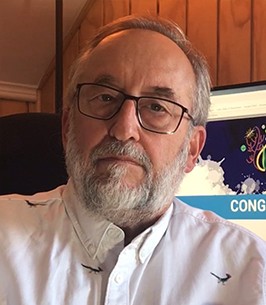Speaker

Session I
Prof. Alejandro H. Buschmann
Centro i-mar, Universidad de Los Lagos, Puerto Montt, Chile
[Session 1-1] Seaweed as a Global Farming Blue Carbon Resource: Opportunities and Challenges
Abstract
Seaweed production is undergoing a rapid global expansion at a time of accelerating climate change, hence raising new challenges for producers and the environment. Currently, a relevant proportion of seaweed production goes to human consumption and the polysaccharide industry, supporting the livelihood of millions of small-scale farmers and processors, including women. After 2010, a significant expansion of the global seaweed cultivation industry has been driven by the growing commercial demand for higher value seaweed-derived products, such as cosmetics, pharmaceuticals, including high-bacto agar used as a laboratory medium for COVID-19 testing, biostimulants and biomaterials among other uses opening new market opportunities. On the other hand, seaweed production has several challenges related to their global expansion like the consolidation of new market opportunities, productivity sustainability, installation of proper and global biosecurity standards, and risk management such as diseases and grazing outbreaks, offshore cultivation conditions, eutrophication and climate change. In relation to these challenges, R&D&I and novel global and country level policies are required.
Introduction of affiliation/ Relation to the Marine Global Project
Since 1986 I have been involved in seaweed production projects phasing aspects like epiphyte and diseases outbreaks, assessing the role of seaweed in Integrated Multi-Trophic Aquaculture systems, developing aquaculture technologies for kelp aquaculture and their biomass transformation at the Universidad de Los Lagos in southern Chile. My approach has been always based on the understanding basic physiological and ecology understanding to move into their applications. I started to be involved in the Korean Marine Global Project in 2019 by participating in The International Symposium for “South and North Korea Marine Global Project” and maintaining thereafter a close contact and collaboration with several Korean researchers.














